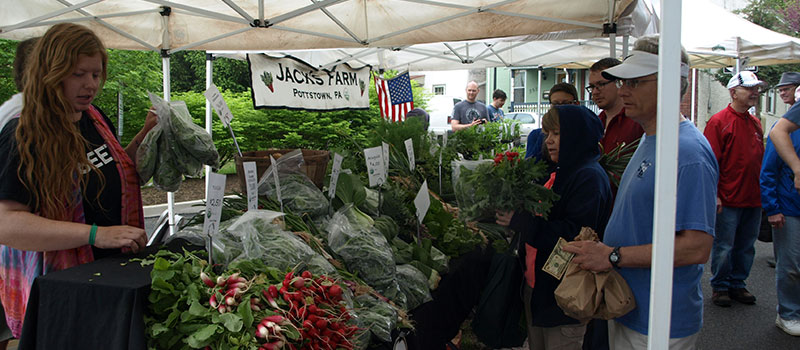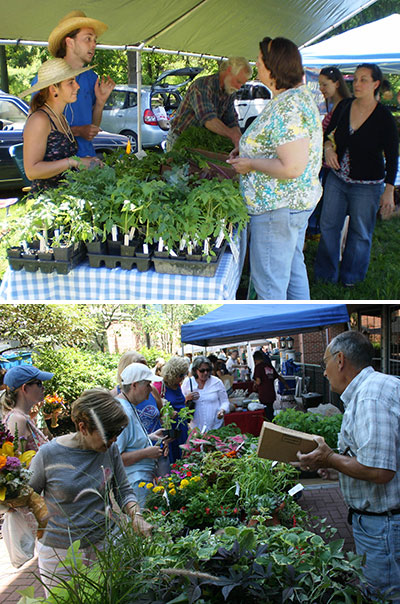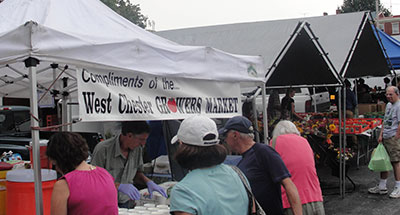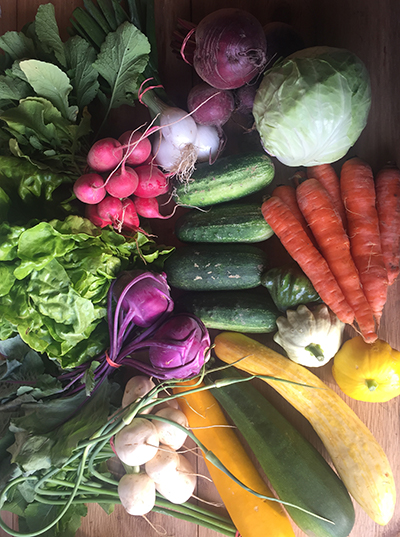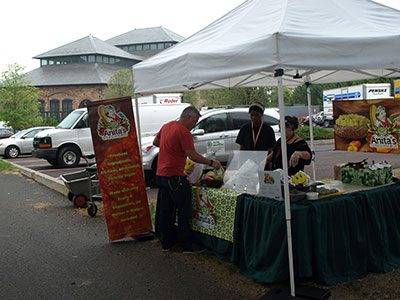Farmers' markets can be located in rural, suburban or urban areas.
How it Works
Farmers' markets can fit the needs of both the farmers and the customers they serve. Some municipalities start their own markets, while other markets are started by interested citizens. Markets can occur in a variety of places, including but not limited to urban centers and suburban parks. They may be held in more rural places as well, but the market will need enough "foot traffic" to make it successful.
The markets generally reflect what the community wants. They generally include temporary setups with little or no permanent infrastructure required. Some markets operate only during the primary growing season, and others operate all year if enough demand exists for year-round products such as dairy, meat, eggs, and mushrooms, and for winter produce such as beets, leeks, potatoes and winter squash.
A Farmers' market will typically have a manager who works with the municipality and vendors to coordinate efforts and handle administration. Farmers' markets generally do not require much ongoing municipal involvement except for parking regulation.
Farmers selling any processed food products must have licenses/certification from both the County Health Department and the Pennsylvania Department of Agriculture. A vegetable farmer that sells whole produce does not require any license, although required to carry insurance. However, if that farmer was to cut their produce, that would be considered processing, and would require a license from the County Health Department. Farmers selling meat are required to have licenses from both the County Health Department and the PA Department of Agriculture, as would any food artisan selling a processed food product like pasta or cookies. Other licensing/certification may apply so check before moving forward.
Benefits
Bring people together
Farmers' markets can become a gathering place, a destination, and a way for urban and suburban residents to engage with each other and with farmers.
Economic development
The markets provide revenue for farmers selling directly to the public and can be a gateway for driving foot traffic to other local businesses.
Help grow the agricultural industry
Some farmers offer a value-added product from their primary operation (such as cheese from a dairy farm) while other farmers sell their primary products (produce, eggs, meat, etc.).
Help with farmland retention
These markets contribute to the continued success of both diversified and single-focused operations and help keep farmland acreage in production.
People learn how food is produced
Consumers have become increasingly aware of the importance of fresh food and want to know where their food comes from and how it is grown. Contact between a farmer and their customers encourages conversation about growing techniques and practices, as well as when produce will be in season, and how to prepare unfamiliar items.
Community health
Fresh vegetables and fruits offer opportunities for more healthy food choices. In addition, the freshness of locally grown items can help foster an appreciation for new foods or remind people of what some foods "used to taste like". Being able to walk to the market represents more health benefits.
Farmers' markets are popular destinations for local residents.
Get Started
Municipalities can support farmers' markets by considering the following actions:
Encourage communication and feedback
Municipalities should talk with farmers, local residents and businesses to evaluate how well the market is working.
The availability of fresh food is a significant benefit to the community.
Considerations
Items for sale
Farmers' markets are intended to provide opportunities for local farmers, therefore, municipalities may want to require that all farmers' markets be "producer-only" markets. Producer-only markets require that all, or at least a significant percentage of the items sold at the market are grown or produced by the sellers themselves.
Market saturation
Check out whether neighboring areas already have farmers' markets. A new, competing market too close to other markets can reduce farmers' profits by drawing customers away and/or diluting the customer base. Also, be sure to hold the market on days that will allow farmers to attend.
Anticipate the effects on neighbors
The market should not disturb neighboring areas. Provisions should be made for safe customer parking and traffic flow and pedestrian movement.
Amenities
To help market areas thrive, amenities such as trash cans, recycling bins, restroom facilities, and shaded seating are helpful.
Phoenixville Farmers Market
Examples
The Borough of Phoenixville permits "outdoor markets" by right in almost all of its zoning districts, with the possibility of preparation, sale and consumption of food and beverages with separate permits and approvals as accessory uses to the outdoor market.
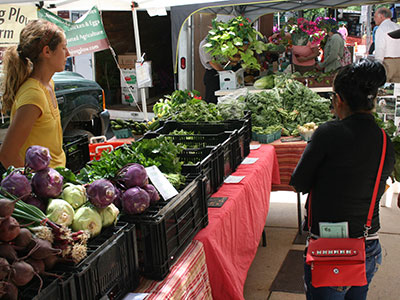
Kennett Square Farmers Market
The Borough of Kennett Square permits open air markets by special exception in the commercial districts and requires that open air markets/non-permanent seasonal markets:
- Be located on an arterial or collector street, as defined by the Official Street Classification Map.
- Have maintained restroom facilities and shall comply with the Pennsylvania Department of Environmental Protection regulations.
- Have adequate on-site parking, including areas for customer parking and vendor loading/unloading.


